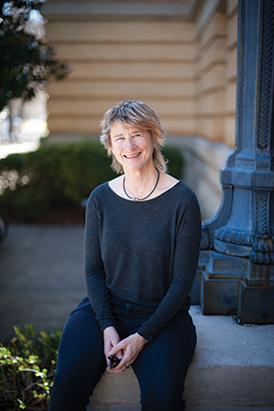
From the 2016 Celebrating Excellence |Four hundred years ago, at the age of 52, William Shakespeare died. He left behind a legacy of nearly 200 plays and sonnets, which students, scholars, actors, and directors have been reading, studying, and adapting ever since.
In anticipation of the anniversary of his death on April 23, Dr. Sharon O’Dair, a professor of Shakespeare in the Department of English and director of UA’s Hudson Strode Program in Renaissance Studies, wondered why, after 400 years, Shakespeare is still one of the most well-known writers in history. In her words, she wanted to know why isn’t Shakespeare dead?
Though answers to the question are numerous, O’Dair’s own career—from her scholarship to her leadership with UA’s endowed graduate program in Renaissance studies—is perhaps the best evidence for why Shakespeare studies continue to thrive.
According to O’Dair, her love for Shakespeare grew out of an interest in social psychology and the ways in which society and social institutions both shape and empower people.
“It seems to me that theatre is like life in a way that narrative and poetry aren’t,” O’Dair said. “I really like the way that characters on stage have to interact, and I am interested in the way research and theory in sociology or social psychology can mesh with theatrical practice; that’s been something I’ve been mulling in my head my entire career.”
Consequently, O’Dair’s Shakespeare studies are often about much more than Shakespeare alone. While she has written traditional criticism on tragedy and character, she also has written pieces relating Shakespeare to queer theory, class structure, the environment, and more.
In 30 years, O’Dair has written 49 articles—with the 50th on its way—and worked on four books.
But she contributed more than just her scholarship to The University of Alabama. For the last 10 years, she has also led the Hudson Strode Program—and the students in the program—to success.
ENHANCING RENAISSANCE STUDY
When Hudson Strode and his wife Thérèse died in the early 1990s, they left behind a considerable sum for the enhancement of the University’s teaching mission. O’Dair was at the University at the time, but she was still what she called a “mere assistant professor pup.”
For 20 years she worked in the Renaissance program, making a name for herself, and in 2006, following the departure of Professor Gary Taylor, she stepped up to be the director.
The Strode Program provides enhanced stipends for students and allows the University to bring nationally and internationally recognized scholars to campus to participate in the biennial Strode seminars and the annual Strode lecture series. It also provides funds for students to attend workshops and seminars at the Folger Shakespeare Library in Washington D.C. and has enabled the creation of the Shakespeare on Film Series and the staged reading series Improbable Fictions.
“Under her expert guidance, the Strode symposia became must-attend events,” said Dr. Sugata Iyengar, a professor at the University of Georgia.
With topics ranging from Hurricane Katrina to American Integration, O’Dair has managed to pull Shakespeare out of his elite canonized shell and push him back into the realm of the everyday, contemporary life.
At the Katrina symposium in 2007, O’Dair brought in scholars who were directly affected by the historic storm. They talked about their experiences in relation to Shakespeare’s The Tempest.
Her most recent symposia have revolved around the 400th anniversary of Shakespeare’s death, and for the anniversary in April, poets from across the nation came to UA not only to talk about how Shakespeare influenced them, but also to share poems that they wrote specifically for the occasion.
“O’Dair has hosted faculty and students from far beyond Tuscaloosa at her symposia,” said Scott Newstok, founding director of the Pearce Shakespeare Endowment at Rhodes College.
He added that her commitment to bringing a wide array of scholars comes from her certainty that anyone could have something to say about works by Shakespeare and the other Renaissance authors.
The symposia are an excellent resource for scholars—but also for her students.
Nic Helms, a 2015 Ph.D. graduate, worked with O’Dair for five years as her student and assistant. He explained that the symposia offered some of the best scholastic exposure of his university experience.
“The wide array of guest lecturers she’s brought to the program, both in symposia and in our two lecture series, is simply staggering,” he said. “In one place, I was exposed to the wealth of early modern literary studies.”
MENTORING YOUNG SCHOLARS
Dr. Phil Beidler, who has been at the University since the Strode Program was founded, said of O’Dair’s leadership, “If there is a distinguishing feature, it is the heavy mentorship responsibility that she takes on with her students.”
“She’s always got someone in the office sitting with her,” he said.
O’Dair said that her mentorship is just a product of trying to do her job well, but to her students it has been the tipping point of their success.
“She gave me meticulous page-by-page comments on drafts for virtually everything I wrote while at UA,” Helms said. “She urged me to write for a wide audience, valuing clarity and concision and always upping the stakes for whatever issue I might be tackling in my work.”
O’Dair’s enthusiasm for scholarship outside of the classroom led Helms to create UA’s Improbable Fictions, a group that performs staged readings of Shakespeare’s plays.
“She was supportive of my work with Improbable Fictions every step of the way,” Helms said. “It’s been great to have a mentor who wants me to excel not only in traditional academic pursuits but in community outreach as well.”
In May, O’Dair will be leaving her 30-year post at the University to return to her native California. She plans to research full-time for another year, after which she will retire from academia.
“The challenge of the Strode Program going forward is to live up to Sharon’s legacy,” Helms said. “These past years under her directorship have been a perfect time to study the Renaissance at Alabama.” •